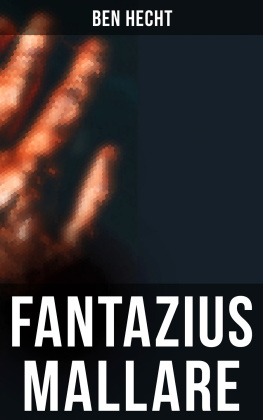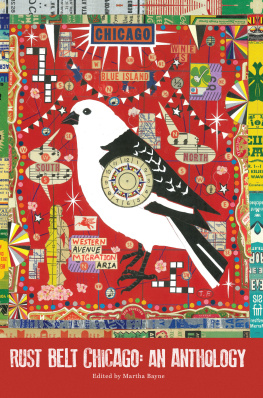Ben Hecht
1001 Afternoons in Chicago

Books
OK Publishing, 2020
Tous droits rservs.
EAN 4064066397098
FANNY
Why did Fanny do this? The judge would like to know. The judge would liketo help her. The judge says: "Now, Fanny, tell me all about it."
All about it, all about it! Fanny's stoical face stares at the floor. IfFanny had words. But Fanny has no words. Something heavy in her heart,something vague and heavy in her thoughtthese are all that Fanny has.
Let the policewoman's records show. Three years ago Fanny came to Chicagofrom a place called Plano. Red-cheeked and black-haired, vivid-eyed andlike an ear of ripe corn dropped in the middle of State and Madisonstreets, Fanny came to the city.
Ah, the lonely city, with its crowds and its lonely lights. The lonelybuildings busy with a thousand lonelinesses. People laughing and hurryingalong, people eager-eyed for something; summer parks and streets whitewith snow, the city moon like a distant window, pretty gewgaws in thestoresthese are a part of Fanny's story.
The judge wants to know. Fanny's eyes look up. A dog takes a kick likethis, with eyes like this, large, dumb and brimming with pathos. The dog'smaster is a mysterious and inexplicable dispenser of joys and sorrows. Hiscaresses and his beatings are alike mysterious; their reasons seldom to bediscerned, never fully understood.
Sometimes in this court where the sinners are haled, where "poised andprim and particular, society stately sits," his honor has a moment ofconfusion. Eyes lift themselves to him, eyes dumb and brimming withpathos. Eyes stare out of sordid faces, evil faces, wasted faces and saysomething not admissible as evidence. Eyes say: "I don't know, I don'tknow. What is it all about?"
These are not to be confused with the eyes that plead shrewdly for mercy,with eyes that feign dramatic navets and offer themselves like primpinglittle penitents to his honor. His honor knows them fairly well. Andunderstands them. They are eyes still bargaining with life.
But Fanny's eyes. Yes, the judge would like to know. A vagueness comesinto his precise mind. He half-hears the familiar accusation that thepoliceman drones, a terribly matter-of-fact drone.
Another raid on a suspected flat. Routine, routine. Evil has its eternalroot in the cities. A tireless Satan, bored with the monotony of his rle;a tireless Justice, bored with the routine of tears and pleadings, liesand guilt.
There is no story in all this. Once his honor, walking home from abanquet, looked up and noticed the stars. Meaningless, immutable stars.There was nothing to be seen by looking at them. They were mysteries to bedismissed. Like the mystery of Fanny's eyes. Meaningless, immutable eyes.They do not bargain. Yet the world stares out of them. The face looksdumbly up at a judge.
No defense. The policeman's drone has ended and Fanny says nothing. Thisis difficult. Because his honor knows suddenly there is a defense. Amonstrous defense. Since there are always two sides to everything. Yes,what is the other side? His honor would like to know. Tell it, Fanny.About the crowds, streets, buildings, lights, about the whirligig ofloneliness, about the humpty-dumpty clutter of longings. And then explainabout the summer parks and the white snow and the moon window in the sky.Throw in a poignantly ironical dissertation on life, on its unchartedaimlessness, and speak like Sherwood Anderson about the desires that stirin the heart. Speak like Remy de Gourmont and Dostoevsky and Stevie Crane,like Schopenhauer and Dreiser and Isaiah; speak like all the greatquestioners whose tongues have wagged and whose hearts have burned withquestions. His honor will listen bewilderedly and, perhaps, only perhaps,understand for a moment the dumb pathos of your eyes.
As it is, you were found, as the copper who reads the newspapers puts it,in a suspected flat. A violation of section 2012 of the City Code. Thirtydays in the Bastile, Fanny. Unless his honor is feeling good.
These eyes lifted to him will ask him questions on his way home from abanquet some night.
"How old are you?"
"Twenty."
"Make it twenty-two," his honor smiles. "And you have nothing to say?About how you happened to get into this sort of thing? You look like agood girl. Although looks are often deceiving."
"I went there with him," says Fanny. And she points to a beetle-browedcitizen with an unshaven face. A quaint Don Juan, indeed.
"Ever see him before?"
A shake of the head. Plain case. And yet his honor hesitates. His honorfeels something expand in his breast. Perhaps he would like to rise andholding forth his hand utter a famous plagiarism"Go and sin no more." Hechews a pen and sighs, instead.
"I'll give you another chance," he says. "The next time it'll be jail.Keep this in mind. If you're brought in again, no excuses will go. Callthe next case."
Now one can follow Fanny. She walks out of the courtroom. The streetswallows her. Nobody in the crowds knows what has happened. Fanny isanybody now. Still, one may follow. Perhaps something will reveal itself,something will add an illuminating touch to the incident of the courtroom.
There is only this. Fanny pauses in front of a drug-store window. Thecrowds clutter by. Fanny stands looking, without interest, into thewindow. There is a little mirror inside. The city tumbles by. The city isinterested in something vastly complicated.
Staring into the little mirror, Fanny sighs andpowders her nose.
THE AUCTIONEER'S WIFE
An auctioneer must have a compelling manner. He must be gabby andstentorian, witheringly sarcastic and plaintively cajoling. He must beable to detect the faintest symptoms of avarice and desire in the blink ofan eyelid, in the tilt of a head. Behind his sing-song of patter as heknocks down a piece of useless bric-a-brac he must be able to remain cool,remain calculating, remain like a hawk prepared to pounce upon his prey.Passion for him must be no more than a mask; anger, sorrow, despair,ecstasy no more than the devices of salesmanship.
But more than all this, an auctioneer must know the magic password intothe heart of the professional or amateur collector. He must know theglittering phrases that are the keys to their hobbies. The words thatbring a gleam to the eye of the Oriental rug collector. The words thatfire the china collector. The stamp collector. The period furniturecollector. The tapestry enthusiast. The first edition fan. And so on.
"Ladies and gentlemen, I desire your expert attention for a moment. I havehere a curious little thing of exquisite workmanship said to be from thefamous collection of Count Valentine of Florence. This delicately molded,beautifully painted candelabra has illuminated the feasts of the oldFlorentines, twinkled amid the gay, courtly rioting of a time that is nomore. Before the bidding for this priceless souvenir is opened I desire,ladies and gentlemen, to state briefly"
* * * * *
Nathan Ludlow is an auctioneer who knows all the things an auctioneer mustknow. His eye is piercing. His tongue can roll and rattle for twelve hoursat a stretch. His voice is the voice of the tempter, myriad-toned andirresistible.
It was evening. An auspicious evening. It was the evening of Mr. Ludlow'sdivorce. And Mr. Ludlow sat in his room at the Morrison Hotel, a decanterof juniper juice at his elbow. And while he sat he talked. The subjectsvaried. There were tales of Ming vases and Satsuma bargains, of porcelainsand rugs. And finally Mr. Ludlow arrived at the subject of audiences. Andfrom this subject he progressed with the aid of the juniper juice to thesubject of wives. And from the subject of wives he stepped casually intothe sad story of his life.









